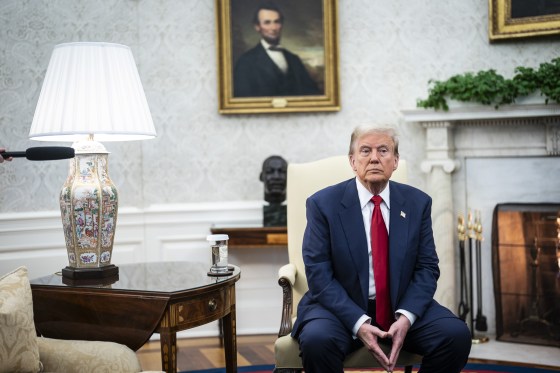
If President-elect Donald Trump fulfills his pledge to slap broad tariffs on goods from China and other foreign nations, many consumers may have to pay more for generic medications, according to policy experts.
Trump suggested 20% general taxes on all imports and at least 60% tariffs on Chinese goods throughout his campaign.
The premise is that raising the cost of imported goods would incentivize American businesses to source more and consumers to purchase more domestically.
However, experts point out a significant problem with that strategy: very few generic medications are indeed produced in the United States.
Generic medication production has shifted overseas over the past few decades as U.S. production has become less viable.
According to Dr. Aaron Kesselheim, a Harvard Medical School professor of medicine, over 80% of all active pharmaceutical ingredients, or APIs, are made in China, India, and other countries, and roughly half of all generic medications are made overseas.
The Association for Accessible Medicines, a trade association that represents generic drug manufacturers, estimates that 90% of all prescriptions filled in the United States are generic medications.
According to Dr. Janet Woodcock, a former acting commissioner of the Food and Drug Administration, importing generic medications is likely to grow more costly if Trump doesn’t provide some sort of exemption. This expense might be passed on to patients or force more struggling generic drugmakers out of the United States.
Woodcock stated, “I believed tariffs were meant to level the playing field and support the growth of domestic industry.” What are you doing, though, if there is no home industry? All you’re doing is charging customers more.
She went on to say, “It just seems like the wrong tool for the problem, for drugs at least.”
Even if the tariffs are only applied to the active substances and not the final goods, they may still result in higher prices, according to Arthur Caplan, chairman of the medical ethics division at NYU Langone Medical Center in New York City. Drugs are manufactured in the United States, although some of their constituents are produced abroad.
“That’s where you need to exercise caution,” he remarked.
It is also doubtful that tariffs would encourage the production of more generic medications in the United States. According to Woodcock, there is little incentive for pharmaceutical companies to invest in new domestic facilities because generic pharmaceuticals generate such low profits.
A squeeze on the generic drug industry?
Trump’s transition team spokesperson Karoline Leavitt refused to comment on whether the president intended to provide an exemption for generic medications.
In a statement, Leavitt said: President Trump implemented tariffs against China during his first term, which boosted investment, produced employment, and prevented inflation. By reshoring American jobs, reducing inflation, increasing real wages, lowering taxes, reducing regulations, and unleashing American energy, President Trump will act swiftly to repair and restore an economy that puts American workers first.
According to Kesselheim, the increased expense would exacerbate the current medicine shortages.
In addition to ordinary treatments like pain and ADHD pills, the United States is facing a scarcity of key life-saving medications, such as IV fluids and chemotherapy drugs.
Half of the 277 ongoing medicine shortages in the United States have lasted for two years or longer, according to the American Society of Health-System Pharmacists, a body that monitors drug shortages.
According to Kesselheim, there is a close relationship between the supply chain, production costs, including shipping, and price. Price increases can result from supply chain interruptions like tariffs, which can cause shortages.
Shortages can result from any disruption in the system, including natural disasters. That’s what happened this year when a facility controlled by Baxter International, the biggest IV fluid maker in the nation, in North Carolina was devastated by water brought on by Hurricane Helene.
Redundancy is necessary. We must be resilient. According to Woodcock, we don’t want to rely solely on one manufacturer in China, India, or Indonesia. However, the United States’ purchasing and financial systems are pushing it in the direction of one or two victors.
According to Kesselheim, the tariffs would also increase the price of name-brand medications, but since they are already so costly, it is unlikely that patients would notice a difference.
According to him, such is not the case with generic medications, which are less expensive and frequently offered for sale at prices that are comparable to their original cost.
According to him, name-brand medications are frequently marketed at monopolistic prices that are hundreds or thousands of times higher than their production costs. It is unlikely that those somewhat higher production costs will have a significant effect.
“It could quickly turn around and impact the price that patients pay with generic drugs,” he warned.
Kesselheim’s main worry is that if additional generic drug makers leave the market, tariffs could drive up the cost of generic medications.
According to him, they will cease selling if the tariffs make it impossible for them to turn a profit. And because of their greater market concentration, the remaining manufacturers in the market may be able to hike prices even more, or there may be a possibility of a shortage.
Note: Every piece of content is rigorously reviewed by our team of experienced writers and editors to ensure its accuracy. Our writers use credible sources and adhere to strict fact-checking protocols to verify all claims and data before publication. If an error is identified, we promptly correct it and strive for transparency in all updates, feel free to reach out to us via email. We appreciate your trust and support!
